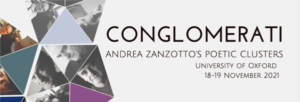 Organised by
Organised by
Adele Bardazzi, Roberto Binetti, and Nicola Gardini
Funded by
The Society for Italian Studies, the Graduate Network of the Faculty of Medieval and Modern Languages at the University of Oxford, the Modern Humanities Research Association, Italian Studies at Oxford, and Italian Poetry Today
On 18th-19th November the conference Conglomerati: Andrea Zanzotto’s Poetic Clusters was held online bringing together scholars from the United Kingdom, Italy, France, and the USA to reflect together on the poetry of one of the most important poetic voices of the 20th century. While celebrating the centenary of the poet’s birth, this conference elicited discussion on the multi-faceted importance of Zanzotto’s writing and thought, and on the diverse strands of its legacy, both within and beyond the intellectual European canon.
The conference programme was rich and with a balanced range of doctoral students, early career researchers and senior academics, and stimulated interesting conversations. Four keynote speakers – Nicola Gardini, Stefano Dal Bianco, John Welle, and Gian Maria Annovi – opened and wrapped up each day. Papers covered the diverse corpus of Zanzotto’s poetry, ranging from a focus on eco-criticism to the use of dialect, his poetic of mourning, and how a series of thinkers, including Benjamin and Lacan, might be implicated in his writings. Intermediality has also been the focus of two papers engaging with Tarkovsky and Fellini (by Matilde Manara and Emanuele Zoppellari respectively).
In order to maximise the impact of the conference, a video editor recorded all sessions and edited them in view of publish them online an a dedicated website that was designed prior to the conference.
Given the online format of the conference, we planned the programme in such a way to have longer breaks compared to an in-person conference, including a two-hour long lunch break. This proved to be beneficial as all participants attended all sessions and maintained a high level of engagement in the discussions. Moreover, we also had slightly longer panel, which allowed having more than half-an-hour slot dedicated to the Q&A after each panel. All of these sessions were highly stimulating and we were happy to see that also participants, who were not presenting their papers, were highly engaged in the conversation. In particular, Andrea Cortellessa, a leading expert on Zanzotto, participated and enriched the Q&A sections. Giovanni Zanzotto also attended the conference, which was particularly interesting with regards to the discussion of Zanzotto’s inediti as presented by Francesco Venturi and the discussion on what can still be done in order to support and promote Zanzotto’s poetry in Italy as well as abroad. The roundtable dedicated to translating Zanzotto’s poetry into English moderated by Emanuela Tandello and with John Welle and Peter Hainsworth proved to be a very good session at the end of the first day and a format that enabled a more informal conversation.
The video recordings of the conference will soon be published on the website and we are putting together a special issue proposal for Italian Studies, which we envisage will be a good opportunity to further expand the contributions presented during the conference and ensure a legacy of the conference.
Adele Bardazzi and Roberto Binetti
